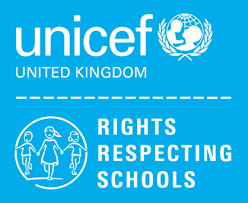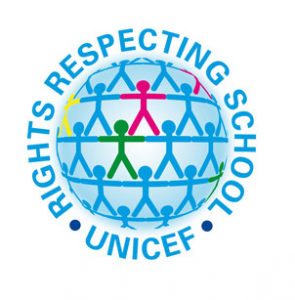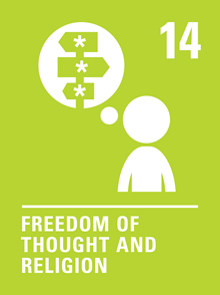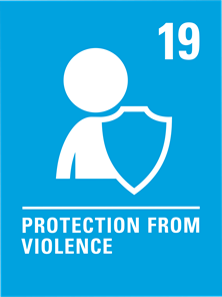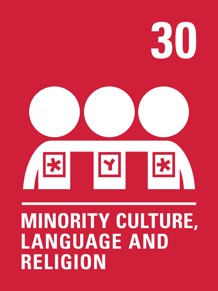St Therese’s Primary is on a journey to become a UNICEF UK Rights Respecting School. We are currently a Bronze – Rights Committed school. This year we are striving to achieve silver.
At St Therese’s we are committed to ensuring children’s well-being is at the heart of everything we do. We aim to help our pupils grow into confident, caring and responsible young people both in school and within the wider community.
All human beings – adults and children alike – are entitled to basic human rights. Children have a particular set of rights due to their vulnerability and need for protection. The UNCRC (United Nations Convention of the Rights of the Child) sets out the rights that must be realised for children to develop to their full potential, free from hunger and want, neglect and abuse. These rights are not something that children need to earn or that adults and governments can take away as a punishment. They contain the basic protection and support that all children are entitled to. All children have the same rights, no matter what their background or where they live.
UNICEF is the world’s leading organisation working for children and their rights. Every child, no matter who they are or where they live, has the right to grow up safe, happy and healthy.
What is the UNCRC?
In 1989 UNICEF established a set of 54 Articles known as the Convention for the Rights of the Child. The convention applies to every child under the age of 18, without discrimination, whatever their ethnicity, gender, religion, language, abilities, whatever they think or say, whatever their family background. Almost every country in the world has signed this convention to uphold the Articles within their country and do all it can to protect children’s rights. The convention underpins everything UNICEF does around the world.
What is the UNICEF Rights Respecting Schools Award?
The UNICEF UK Rights Respecting School Award (RRSA) is based on principles of equality, dignity, respect, non-discrimination and participation. The RRSA seeks to put the UN Convention Rights of the Child at the heart of a school’s ethos and culture to improve well-being and develop every child’s talents and abilities to their full potential.
The RRSA focuses on children’s rights in schools and takes a whole-school approach to child rights and human rights education. A UNICEF Rights Respecting School is a community where children’s rights are learned, taught, practised, respected, protected and promoted.
How does my school become a Rights Respecting School?
- At St Therese’s we will make sure the best interests of the child are a top priority in all actions. Adults will be committed to placing the values and principles of the Convention at the heart of all policies and practices
- The whole school community will learn about the convention with a shared understanding to work for global justice and sustainable living Students and adults will collaborate to develop and maintain a rights-respecting school community in all areas and in all aspects of life based on the Convention.
- St Therese’s will aim to empower all children to become active citizens and learners.
At St Therese’s we strongly believe that every child has the right to say what they think in all matters affecting them and to have their views taken seriously. Young people at St Therese’s will develop the confidence, through their experience of an exclusive rights-respecting school community, to play an active role in their own learning and to speak and act for the rights of all to be respected locally and globally.
By learning about their rights, our pupils also learn about the importance of respecting the rights of others i.e. their responsibilities. Pupils at St Therese’s are encouraged to reflect on how their behaviour and actions affect those around them which allows us to build and maintain a positive and safe learning environment for all.
For more information about the Rights Respecting School Award, please go to: http://www.unicef.org.uk/rights-respecting-schools/
For more information about the UNICEF, please go to: http://www.unicef.org.uk/
For the UN Convention Child Friendly Rights of the child, go to: http://www.unicef.org/rightsite/files/uncrcchilldfriendlylanguage.pdf
Here are some articles we will be focusing on this year.
| Article | Month | Term |
| 28- Right to an education
|
September | Autumn |
| Launch of new school year | ||
| New classes/ pupils/staff
Creation of charters International Literacy Day World Water Week Jeans for Genes Day International Day of peace Harvest
|
||
| 12- Right to be heard or article 25- Right to meet with friends and join groups | October | Autumn |
| Election of school council: healthy schools, eco, RRSA, & PUIL VOICE TEAMS etc
After school Clubs World Teachers Day World Smile Day United Nations Day |
||
| Article 19- Right to be safe | November | Autumn |
| Firework night
Internet Safety Remembrance Sunday Armistice Day Anti- bullying Week Road Safety Week World toilet Day Universal Children’s Day Children In Need |
||
| Article 14- Right to follow your own religion | December | Autumn |
| Christmas Celebrations
Nativity Story Customs from around the World Human Rights Day |
||
| Article 29- Right to be the best we can be | January | Spring |
| New Years Resolultion/Promises
Review Charters Review individual targets/learning plans Chinese New Year |
||
|
Article 2- All children have rights |
February |
Spring |
| UNICEF Day for Change
Red Hand day for soldiers Fairtrade Fortnight International STAND UP to Bullying Day |
||
| Article 7- Right to a name and a nationality/identitiy | March | Spring |
| St Davids Day
World Book Day Comic Relief St Patricks Day World Poetry Day World Water Day Sport Relief Games |
||
| Article 24- Right to food, water and medical care | April | Summer |
| Easter
International Children’s book day World Health Day International Day for Street children International Mother Earth Day World Malaria Day Wateraid |
||
| Article 27- Right to a good standard of living | May | Summer |
| World Asthma Day
National Children’s Book Week Europe Day World Fairtrade Day Christian Aid Week Walk to school week Africa Day |
||
| Article 6- Right to life and to be heathy | June | Summer |
| International Children’s day
World Environment Day National School Grounds Week World Day against child labour World Refugee Day Child Safety Week |
||
| Article 31- Right to relax and play | July | Summer |
| Sports Day
Year 6 Transition Day End of School trips/events International Youth Day |
Click here to see all articles in picture format.
These are some of the articles that pupils have discussed.
Article 7 – Every child has the right to be registered at birth, to have a name and nationality, and, as far as possible, to know and be cared for by their parents.
Article 14 – Every child has the right to freedom of thought, belief and religion.
Article 28 – Every child has the right to an education.
Article 19 – Every child has the right to protection from violence, abuse and neglect.
Article 42 – Every child has the right to know about their rights.
Article 2 – All children have rights whatever their ethnicity, gender, religion, language, abilities, or any other status, whatever they think or say, whatever their family background.
Article 30 – I have the right to learn and use the language, customs and religion of my family whether or not these are shared by the majority of the people in the country where I live.
Article 17 – I have the right to reliable information from a variety of sources as long as it doesn’t harm me.
Article 23 – A child with a disability has the right to live a full and decent life with dignity, and as far as possible, independence, and to play an active part in their community.
